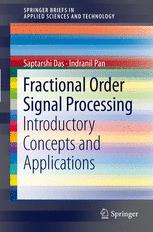

Most ebook files are in PDF format, so you can easily read them using various software such as Foxit Reader or directly on the Google Chrome browser.
Some ebook files are released by publishers in other formats such as .awz, .mobi, .epub, .fb2, etc. You may need to install specific software to read these formats on mobile/PC, such as Calibre.
Please read the tutorial at this link: https://ebookbell.com/faq
We offer FREE conversion to the popular formats you request; however, this may take some time. Therefore, right after payment, please email us, and we will try to provide the service as quickly as possible.
For some exceptional file formats or broken links (if any), please refrain from opening any disputes. Instead, email us first, and we will try to assist within a maximum of 6 hours.
EbookBell Team

5.0
108 reviewsThe book tries to briefly introduce the diverse literatures in the field of fractional order signal processing which is becoming an emerging topic among an interdisciplinary community of researchers. This book is aimed at postgraduate and beginning level research scholars who would like to work in the field of Fractional Order Signal processing (FOSP). The readers should have preliminary knowledge about basic signal processing techniques. Prerequisite knowledge of fractional calculus is not essential and is exposited at relevant places in connection to the appropriate signal processing topics. Basic signal processing techniques like filtering, estimation, system identification, etc. in the light of fractional order calculus are presented along with relevant application areas. The readers can easily extend these concepts to varied disciplines like image or speech processing, pattern recognition, time series forecasting, financial data analysis and modeling, traffic modeling in communication channels, optics, biomedical signal processing, electrochemical applications and many more. Adequate references are provided in each category so that the researchers can delve deeper into each area and broaden their horizon of understanding. Available MATLAB tools to simulate FOSP theories are also introduced so that the readers can apply the theoretical concepts right-away and gain practical insight in the specific domain.